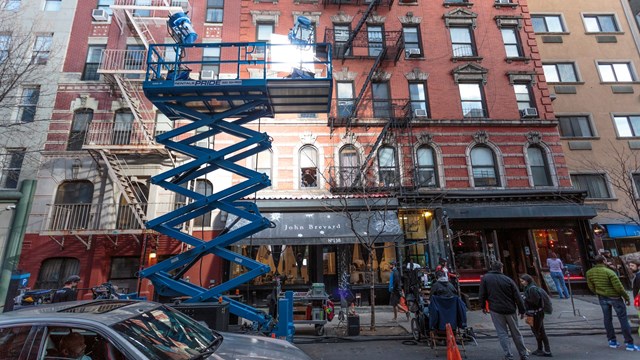The main source of any co-op or condo building’s revenue comes from maintenance charges. That seems self-evident.
But sometimes a building or development may suddenly need to undergo emergency repairs or fund large capital improvement projects, and the board may be reluctant to once again raise maintenance fees, especially if the co-op or condo is a middle income or low income development. The building may then seek to come up with other, creative ways to increase their cash flow, build up their reserve fund and stay solvent.
What are some of the most common ways of alternative revenue generating in co-op or condo buildings? One of the most visible ways may be to rent out your rooftop to a cell phone company for cell phone antennas. This, indeed, could be a bonanza for residential buildings, whether they are co-op, condo or rental. Especially in the early 2000s, they seemed to be going up everywhere.
But that opportunity may be drying up. “There’s so much consolidation—there used to be eight or nine cell phone companies, now we’re stuck with four,” says Greg Cohen, president of Impact Real Estate Management located in Queens.
There are also people who believe that cell phone towers and the microwaves they emit could be a danger to people’s health. Indeed, in several areas of the city, including Bay Ridge, Park Slope and Astoria, groups of residents have protested decisions by apartment buildings to allow the towers.
Furthermore, if you put want to put in cell phone antennas within the city nowadays, says Carl Cesarano, CPA, a principal of the Floral Park-based accounting firm of Cesarano & Khan, P.C., “The city of New York may be your competition.” In many areas, the city is providing space to cell phone and wireless providers on city property.
Mary Ann Rothman, executive director of the Council of New York Cooperatives & Condominiums (CNYC), points out that co-ops and condos often are able to change unused space, like basements, into playrooms/meeting rooms, bicycle rooms, exercise or storage rooms—and usually they charge a fee for these services.
Here’s another way: Some buildings also rent portions of their outside walls that have no windows for advertising signs—a practice that goes back to the 19th century (look at the www.forgotten-ny.com blog for some faded, vintage examples). There are even brokers who attempt to match up buildings and cell phone or advertising sign firms.
Some Financial Means
Some other ways of alternative financing don’t involve using space in your building.
Stuart A. Bruck, director of mortgage brokerage at Manhattan-based Time Equities Inc., mentions flip taxes—not really taxes, but fees paid by buyers or sellers in a co-op transaction. “The vast majority of buildings have initiated some type of flip tax,” he says. “Now that the market has become stronger, at least in Manhattan, flip taxes are more easily acceptable.” Although not definitive, a study done by Manhattan law firm Stroock Stroock & Lavan a few years ago estimated that nearly 60 percent of co-ops in New York have a flip tax in place.
However, he adds, “If you have a situation where values have gone down, [the unit owner] might have to sell for a loss, but may still have to pay a flip tax, adding additional pain.”
Having a line of credit is also “a popular thing to do,” says Cesarano. On a related subject, he also mentions that “you’re supposed to have your revenue set at least 110 percent of operating expenses.” This is an FHFA Fannie Mae requirement for condos that want a loan; a requirement “that is spreading to co-ops.”
Finally, “especially in Manhattan and Brooklyn, but even in Queens, a lot of our buildings have been contacted by scouts who want to use them for movies and commercials [for a fee],” says Cohen. Indeed, in Brooklyn Heights and DUMBO, near this writer’s “regular” non-Cooperator job, hardly a week goes by without someone using the streets or buildings for a commercial, a TV episode or a film.
As far as tax abatements are concerned, the city’s Cooperative and Condominium Tax Abatement gives partial tax relief to owners and shareholders, with some exceptions. This law was passed to reduce the disparity between property taxes paid by owners of single-family houses and those paid by co-op and condo owners. For information go to the Department of Finance website at http://www.nyc.gov/html/dof/html/pdf/faq/coop_condo_tax_abatement_faq.pdf
However, this may not help the building itself. “I don’t see anywhere in the New York rules saying you can keep this money, says Cesarano. “It must be refunded [to the owners].”
If your budget has a shortfall, whether for operating or capital purposes, a special assessment is appropriate, Cesarano adds. This must be done equally on a per-share basis.
Now, we’ve heard some of the possibilities for alternative, or supplementary, financing for co-ops and condos. What resources about alternative financing are available to a board of a building that doesn’t have the services of a professional manager?
The board members can read periodicals, go to trade shows and seminars, and join organizations like the CNYC or the Federation of New York Housing Cooperatives & Condominiums (FNYHC). They can, of course, also subscribe to The Cooperator.
Smaller Buildings
If your co-op or condo building is small—say, 10 or 12 units—many space-related ways of alternative financing, such installing an exercise room or a storage room, may be more difficult for you.
Still, says Cohen, “Every building has common elements that haven’t been used, whether it’s selling air rights or using your basement space, roof space, space wherever you can use it.”
Rothman said that for smaller buildings, the best bet may be using the roof. We’ve heard about cell phone towers (by now, you may even be tired of reading about them), but boards can also think about turning their roofs into “green roofs” with garden decks. Although these don’t directly bring money into the building, she says, they save unit owners money on insulation, enhance the quality of life, and could enhance the selling value of the units.
Another tactic for smaller buildings suggested by Cesarano, one that doesn’t require space, is levying administration fees. These could range from credit-check fees to move-in or move-out fees to subletting fees to dog registration fees. Still, boards who wish to do this should consult their attorney for appropriate legal requirements.
Boards and Managers
At any rate, to increase a building’s cash flow, boards and managers must work together. The board has the ultimate responsibility but the manager often has the experience and professional know-how. “He’s the one who has to tell the board of a six-unit building that if they want to put in a 5,000-square-foot playroom, it won’t work,” says Rothman.
Managers, says Bruck, “have their ear to the ground. They have more experience, they know taxes are going up, they know the price of oil is going up. Well before the budget begins to germinate, they are aware that expenses are going up and come up with suggestions.”
“A good management company,” adds Cohen, “prepares the budget, then issues a monthly statement, with income expenses vs. the budget.”
Echoes of Old 80-20 Rule
One item we haven’t mentioned that is working in co-ops’ and condos’ favor is a piece of legislation passed several years ago, the Mortgage Forgiveness Debt Relief Act of 2007, sponsored by Congressman Charles Rangel. The measure allowed co-ops to determine commercial rents without the fear that the additional income would disqualify owners from deducting their proportionate share of the building’s mortgage interest and taxes.
Under the previous law, known as the “80-20 Act,” co-ops were limited to charging commercial tenants rent that didn’t total more than 20 percent of the building’s total income from rents and/or cooperator maintenance payments.
But now, co-ops are allowed to pass through applicable tax benefits to their owners if even one of the three following requirements is met: if 80 percent or more of the co-op’s gross income comes from the shareholders; if 80 percent of the total square footage of the building is used for residential purposes, or if 90 percent of the costs of operating the building are for the benefit of the shareholders.
This gives many boards more flexibility in renting to higher-paying stores, which, of course, brings more income (see “New Options for Co-ops” by this author in the July 2008 Cooperator). An estimated 25 to 30 percent of all New York City co-ops or condos have commercial tenants, according to the article.
Is it ever worth it to forego the tax benefits of staying on the right side of the rule, as it’s currently written, in favor of more money coming in? Better ask your accountant, says Cohen.
Do Shareholders Have a Say?
Do shareholders have a say in how their building makes money--do they have the right to veto a commercial tenant, or to vote against putting advertising signs on the side of the building, for example?
Shareholders, says Rothman, are able to remove and/or replace board members at annual elections and have right to voice their opinions. But once the board is elected, it holds the financial responsibility for the building. Legally, board members are “fiduciaries” to the shareholders or unit owners who have elected them to positions of power. Of course, the bylaws could specify a variation of this general rule.
In general, in making decisions about ancillary or secondary ways of raising revenue for a co-op or condo building, it’s best to seek the expertise of your manager, your attorney and your accountant.
Raanan Geberer is a freelance writer and editor based in New York City and a frequent contributor to The Cooperator.







Leave a Comment